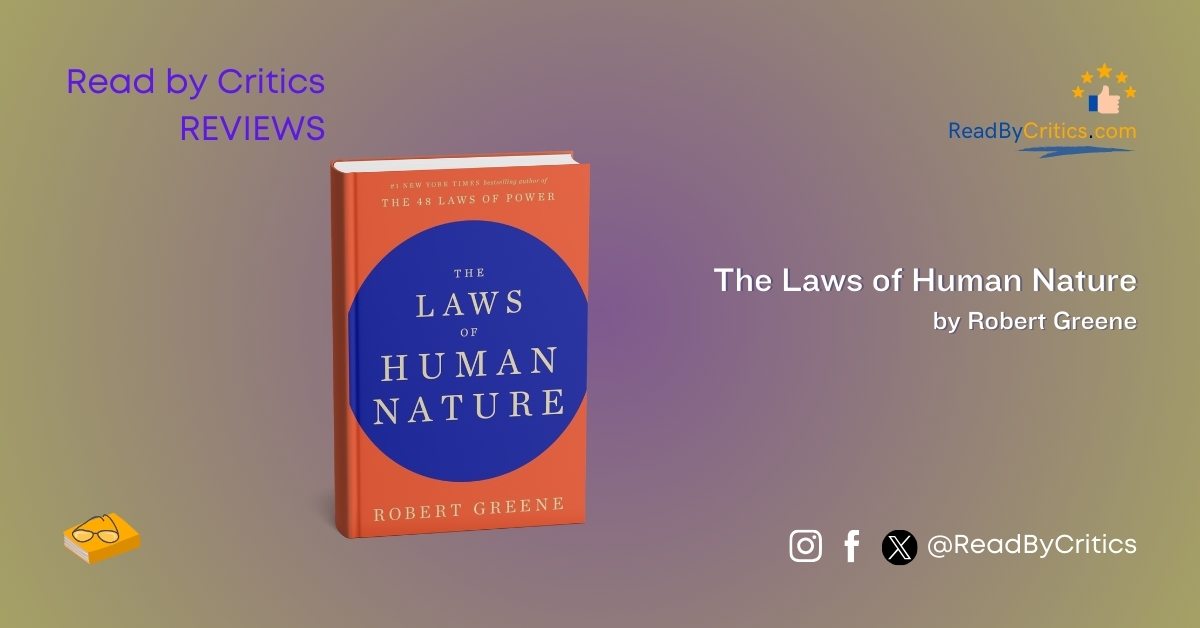Robert Greene’s The Laws of Human Nature (2018) is a formidable entry in the crowded genre of self-help and social strategy literature, distinguished by its ambitious synthesis of psychology, history, and philosophy. At its core, the book is an exhaustive examination of the driving forces behind human behaviour, offering readers a toolkit for navigating social dynamics with heightened awareness. Greene, best known for The 48 Laws of Power, expands his scope here, moving beyond Machiavellian tactics to explore the deeper psychological underpinnings of why people act the way they do. The book’s central premise is that understanding human nature—our innate tendencies toward irrationality, self-sabotage, and emotional reactivity—allows individuals to master their impulses and influence others more effectively. What sets The Laws of Human Nature apart from similar works is its historical depth; Greene doesn’t just theorise about behaviour but illustrates his points with vivid case studies ranging from the self-destructive pride of Richard Nixon to the empathetic genius of Abraham Lincoln. This approach lends the book a scholarly weight often missing in contemporary pop-psychology, though it occasionally strays into overgeneralisation in its attempt to distil human complexity into immutable “laws.”
One of the book’s most compelling sections is its exploration of narcissism, which Greene dissects with clinical precision. He argues that narcissism is not merely a personality disorder but a spectrum on which all individuals fall, manifesting in behaviours as subtle as chronic defensiveness or as overt as grandiosity. His analysis of figures like Adolf Hitler and Steve Jobs serves to illustrate how unchecked narcissism can lead to both monumental success and catastrophic downfall. Greene’s insistence that readers confront their narcissistic tendencies—rather than simply diagnosing them in others—is a refreshing departure from the blame-shifting common in modern discourse. Yet, while his historical examples illuminate, some critics might argue that his framework oversimplifies psychological complexities. For instance, his assertion that narcissism can be “managed” through self-awareness, while theoretically sound, doesn’t fully account for the deeply ingrained nature of such traits or the role of environmental factors in shaping them. This tension between Greene’s deterministic laws and the messy reality of human behaviour is a recurring theme in the book that both enriches and undermines its arguments.
The Laws of Human Nature truly excels in its pragmatic application of psychological principles. Greene doesn’t just diagnose human flaws; he provides actionable strategies for mitigating them. For example, his chapter on emotional intelligence emphasises the importance of “stepping outside oneself” to observe one’s reactions objectively—a technique he attributes to historical figures like Frederick Douglass, who mastered self-control under extreme oppression. Similarly, his discussion of envy, which he claims is more pervasive than most admit, offers shrewd advice on defusing rivalries by subtly acknowledging others’ insecurities. These insights align with classical philosophy (e.g., Stoicism’s emphasis on self-mastery) while remaining accessible to modern readers. However, the book’s prescriptive tone sometimes veers into manipulation, particularly in sections advising readers to “play the long game” by strategically endearing themselves to others. While Greene frames this as social intelligence, it’s hard to ignore the ethical ambiguity of treating relationships as calculated moves in a power dynamic—a criticism often levelled at his earlier work.
Comparatively, The Laws of Human Nature occupies a unique space between academic psychology and street-smart pragmatism. It lacks the statistical rigour of works like Daniel Kahneman’s Thinking, Fast and Slow, which grounds its insights in decades of experimental research. Still, it surpasses most self-help books in depth and historical grounding. Unlike Malcolm Gladwell’s Outliers, which focuses on external factors shaping success, Greene zeroes in on internal drivers—our hidden motivations, repressed emotions, and unconscious biases. This introspective focus is both the book’s strength and its limitation. While Greene’s historical anecdotes are engaging, they sometimes feel cherry-picked to fit his theories, glossing over contradictory evidence. For instance, his portrayal of Martin Luther King Jr. as a paragon of emotional control sidesteps the civil rights leader’s documented struggles with doubt and depression. This nuance would complicate Greene’s tidy narrative of mastery.
Another critique worth noting is Greene’s tendency to universalise his laws, presenting them as timeless truths rather than contextual observations. As social science increasingly shows, human nature is shaped by cultural and temporal forces; behaviours deemed “irrational” in one era may be adaptive in another. Greene’s chapter on conformity, while astute in its analysis of groupthink, doesn’t fully grapple with the evolutionary benefits of social cohesion. Similarly, his admonition against “toxic types” (e.g., the Chronic Complainer or the Rigid Rationalist) risks reducing people to caricatures, ignoring the spectrum of human adaptability. These simplifications may stem from Greene’s overarching goal: to create a manual for personal empowerment rather than an academic treatise. Still, readers seeking nuance might wish for more caveats and fewer absolutes.
Despite these criticisms, The Laws of Human Nature succeeds in its primary aim: to provoke introspection and sharpen social perception. Few books in the genre combine historical storytelling with practical advice as effectively, even if the synthesis isn’t seamless. Greene’s writing, though dense, is lucid and compelling, laced with quotable insights like “The greatest power you possess is your ability to resist your emotions.” Whether one agrees with his methods or not, the book undeniably challenges readers to scrutinise their behaviour and that of others—a rare feat in an era of superficial self-improvement. Its true value may lie not in its laws as gospel, but in its invitation to engage critically with the forces that govern our lives. In this sense, Greene’s work transcends its genre, offering strategies and a lens to view the endlessly fascinating puzzle of human nature.
The Laws of Human Nature by Robert Greene is ideally suited for intellectually curious readers who seek more than superficial self-help—those who desire a historically rich, psychologically nuanced understanding of human behaviour. Aspiring leaders, entrepreneurs, and strategists in competitive fields like business, politics, or creative industries will find immense value in Greene’s analysis of power dynamics, emotional intelligence, and manipulation, as will students of psychology and history, who may appreciate his biographical case studies while noting the lack of academic rigour. Fans of classical strategy (Sun Tzu, Machiavelli) and philosophy (Nietzsche) will resonate with Greene’s unflinching dissection of human motives, even if his modern interpretations occasionally oversimplify. The book appeals most to introspective individuals willing to confront uncomfortable truths about their irrationality, narcissism, and susceptibility to social influences. However, its strategic, sometimes cynical tone may deter readers from seeking purely ethical or collaborative relationship approaches. At 600 pages, it demands patience, rewarding those who view human interaction as a puzzle to decode rather than just a realm for authenticity. While casual self-help readers may find it dense, analytically minded thinkers will see it as a masterclass in deciphering the hidden mechanics of social power.
Interested? Get a copy from Amazon India – click here.
Review by Madhav for ReadByCritics
…
The Laws of Human Nature by Robert Greene, a book review
-
Critical Rating
Summary
A classic Robert Greene profiling of human nature – if you read him before, you can expect what to expect. If not, welcome to Robert Greene’s colourful yet black and white world!




